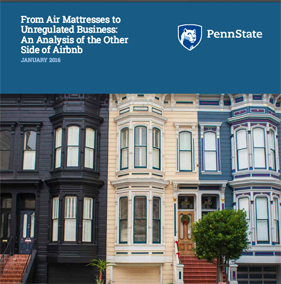Sharing economy – more share, less fair?

AirBNB under threat in UK, US, Australia
The sharing economy seemed a very good idea at the time. It seemed to offer really authentic accommodation and the opportunity for locals to engage directly with visitors. And, of course, all were to share in the proceeds of this new, people-powered innovation.
But now AirBNB is the third biggest Unicorn after Uber (billion-dollar plus tech start) and its investors now own a business valued at $25bn – many are asking what has happened.
In the US a new report shows that nearly 30 percent ($378 million) of Airbnb’s revenue came from "full-time operators," with rentals available 360 days a year. Each of these operators averaged more than $140,000 in revenue during the period studied.
The report: "From Air Mattresses to Unregulated Business: An Analysis of the Other Side of Airbnb" focuses on "hosts" in these top markets who rent multiple units and the length of time they are renting their units. It tells a very different story about who is driving revenue on the site.
"Operators renting out three or more units represent a disproportionate share of revenue with only 7 percent driving more than $325 million in the period studied," said Dr. John O’Neill, Professor and Director of the Center for Hospitality Real Estate Strategy at Pennsylvania State University, who directed the research. "Our industry thrives on competition each and every day, operating on a level and legal playing field. And we believe new entrants to the market like Airbnb and the commercial businesses they facilitate have those same obligations,"
Said American Hotels and Lodging Association President and CEO Katherine Lugar. "This is not about ‘home sharing’, – a practice that has existed for decades as a way for individuals to make a little extra cash by renting out the occasional room or home. This is the face of Main Street and the wallet of Wall Street"
"As a corporation valued at more than $25 billion, they have a responsibility to protect their guests and communities; they should not be enabling the corporate landlords who are clearly using their platform to run illegal hotels."
In Australia – Tourism Accommodation Australia, has called for urgent regulation of commercial short-term accommodation operators. They say that AirBNBs should be subject to similar safety and operational regulations as legitimate operators
Said TAA CEO Carol Giuseppi: "In the past few months we have seen the results of the ‘no care, no responsibility’ attitude towards unregulated short-term accommodation with reports of assaults, property damage and a terrifying drug raid. Overseas, there have also been reports of deaths."
"The reality for many people involved in the so-called ‘collaborative’ economy is that they take rather than give. They contribute virtually nothing to employment, where as hotels and other legitimate operators employ 21,000 people in NSW. They contribute nothing to collaborative tourism promotion. They often avoid paying appropriate taxes and community charges."
And in the UK the British Hospitality Association (BHA) went head to head with Airbnb in UK parliament

Ufi Ibrahim at UK Parliament
"Industrial in scale, professional landlords, operating outside UK regulations and endangering the safety of the public." said BHA CEO, Ufi Ibrahim, providing evidence to the Business Innovation and Skills Committee on behalf of the hospitality and tourism industry.
Ms Ibrahim said that home exchange websites are made up of many large-scale landlords, operating multiple properties rather than individual homeowners which the sharing economy was intended to service. The effect of this, she said, was reduced housing stock, increased crime and disruption of local communities. Moreover London’s trusted reputation as a destination was being damaged.
BHA research indicated that 40% of all home-exchange website listings are ‘professional landlords’ running unregulated ‘pseudo-hotels’ and the top 1000 home-exchange hosts are netting £150m of accommodation revenue annually
Said Ms Ibrahim "Platforms such as Airbnb are allowing hosts to circumvent planning regulations, break short lettings regulations and avoid tax, food, health and fire safety regulations.
She offered 3 key proposals:
- Home exchange websites should share with government bodies (London Authorities & Councils, HMRC) named host level data to demonstrate clearly who is letting over 90 nights in London, how many people are letting out a secondary residence, how much tax is due on the income and how staff are employed and paid to service multi-rentals?
- Home exchange websites should directly restrict landlords from letting out for more than 90 days per year through their platform.
- Home sharing websites should require much stricter checks on safety and security, something other sharing economy platforms, such as Uber, have already implemented.
Valere Tjolle
@ValereTjolle [email protected]
 United Kingdom
United Kingdom United States
United States Asia Pacific
Asia Pacific












































BA suspending all Heathrow to Abu Dhabi flights
Unexpected wave rocks cruise ship
Report: Cruise guest died after ship lashed in heavy storm
British teen in serious condition after paraglider collision
JetBlue scraps London Gatwick flights